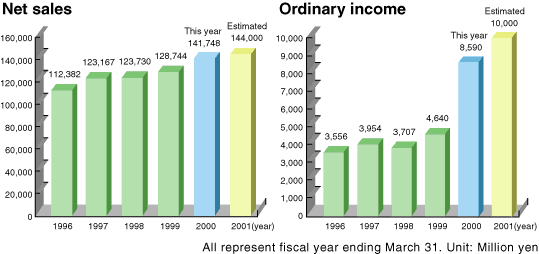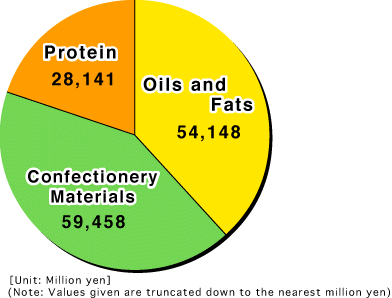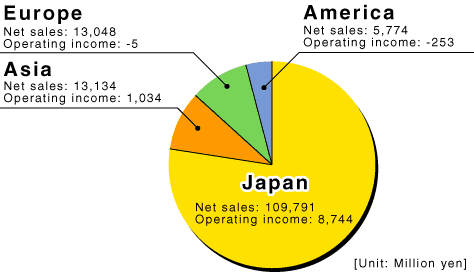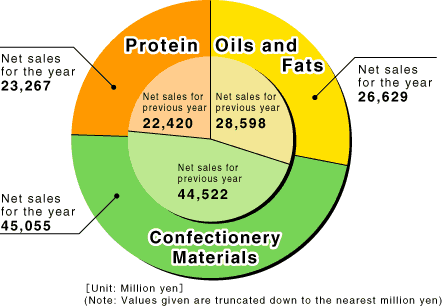News Release
Financial results
FUJI OIL HOLDINGS
Announcement of the Settlement of Consolidated and Non-consolidated
2000.5.18
On the afternoon of May 18, we announced the settlement of consolidated and non-consolidated accounts for the year ended on March 31, 2000 at the Stock Exchange Press Club. The details of which are as follows:
A. Settlement of Consolidated Account
Results of the fiscal year ended on March 31, 2000 (April 1, 1999 to March 31, 2000)
(1) Environmental conditions of fiscal year report
During the whole period, the drastically low individual consumption continued for an extremely severe environmental condition. However, for Fuji Oil, oils and fats for making chocolate, chocolates, confectioneries and pastries, water-soluble soy polysaccharides, and soy-protein food products started showing favorable results and a remarkable performance. Due in part to the high yen rate and lowering of the market price of raw materials, total sales increased to 141.7 billion yen (up 10.1%). Additionally, operating income reached Fuji Oil's historical high of 9.5 billion yen (up 64.8%) and ordinary income increased to 8.5 billion yen (up 85.1%) yielding a net profit for the term of 4.3 billion yen, which is an amazing 270.4% of that of last fiscal year.
(2) Management report
(Note:Values given in this table are rounded down to the nearest million yen)
(%) is the percent of increase compared to previous year.
| Net sales (millions of yen) (%) | Operating income (millions of yen) (%) | Ordinary income (millions of yen) (%) | Net income (millions of yen) (%) | |
|---|---|---|---|---|
| 4/1/99 to 3/31/00 | 141,748 (10.1) | 9,585 (64.8) | 8,590 (85.1) | 4,319 (170.4) |
| 4/1/98 to 3/31/99 | 128,744 ( 4.1) | 5,815 (33.8) | 4,640 (23.9) | 1,597 (12.1) |
| Ratio of net profiton stockholders equity | Ratio of ordinary income to total capital | Ratio of ordinary income to net sales | |
|---|---|---|---|
| 4/1/99 to 3/31/00 | 7.2 % | 6.6 % | 6.1 % |
| 4/1/98 to 3/31/99 | 2.7 % | 3.7 % | 3.6 % |
- (Note: Profit based on the equity-method investment balance is 40 million yen for 4/1/99 to 3/31/00 and 83 million yen for 4/1/98 to 3/31/99)
Expected of the fiscal year ending on March 31, 2001 (April 1, 2000 to March 31, 2001)
| Net Sales (millions of yen) | Ordinary Income (millions of yen) | Net Income (millions of yen) | |
|---|---|---|---|
| 4/1/00 to 3/31/01 | 144,000 | 10,000 | 3,300 |
- (Note: Differences after retirement pay obligations are moved, consolidated 3.8 billion yen and non-consolidated 3.5 billion yen, are retired at once.)

(1) Operations by division

(2) Operations by region

B. Settlement of Non-consolidated Accounts
1. Results of the fiscal year ended on March 31, 2000 (April 1, 1999 to March 31, 2000)
(1) Environmental conditions of fiscal year report
This fiscal year marks the 50th anniversary of the founding Fuji Oil. With the motto of "Let Our 50-year Flower Bloom," for these past few years Fuji Oil has been striving for group management, global management, speedy management, and low-cost management.
Despite the continued severe environmental conditions resulting from slumping domestic consumption on the business front, on the cost front, the recovery of the weak yen, the lowering of the market price of raw materials, endeavors to reduce costs, fervent investing during recent years, and low cost business that does not increase fixed costs have all contributed to increased profits. Along with breakthroughs in new product development and steps into new fields, increased adaptability and responsiveness brought about by improved productivity have allowed Fuji Oil to meet a larger variety of consumer needs. With the promoting of proposals from both the hardware and software facets of business, the amount of sales increased. Net sales, however, caused by a drop in sale unit prices due to the state of market products, stopped at 94.9 billion yen (down 0.6% from previous year).
Operating income reached Fuji Oil's historical high of 8.7 billion yen (up 72.6% from previous year) and ordinary income rose to 8.7 billion yen (up 71.9% from previous year) for the fifth straight year of increase.
Since the valuation method of securities holding changed from the separate lower-of-cost-or-market-method used until now to the "reclassification" method, extraordinary profit appeared 0.9 billion yen.
Regarding extraordinary losses, though already accounted for in the settlement of consolidated, a total of 4.0 billion yen was appropriated. This included 2.8 billion yen reserved for accumulated losses from subsidiaries and 600 million yen for losses due to the abandonment and sales of fixed assets.
After taking the results from above and subtracting corporate tax and the such, the profits for this fiscal year resulted in 3.0 billion yen (up 35.8% from previous year).
(2) Management report (Note:Values given in this table are truncated down to the nearest million yen)
(%) is the percent of increase compared to previous year.
| Net sales (millions of yen) (%) | Operating income (millions of yen) (%) | Ordinary income (millions of yen) (%) | Net income (millions of yen) (%) | |
|---|---|---|---|---|
| 4/1/99 to 3/31/00 | 94,951 (0.6) | 8,775 (72.6) | 8,797 (71.9) | 3,013 (35.8) |
| 4/1/98 to 3/31/99 | 95,541 (3.3) | 5,084 (26.4) | 5,117 (13.1) | 2,219 (24.0) |
| Ratio of net profiton stockholders equity | Ratio of ordinary income to total capital | Ratio of ordinary income to net sales | |
|---|---|---|---|
| 4/1/99 to 3/31/00 | 4.6 % | 7.7 % | 9.3 % |
| 4/1/98 to 3/31/99 | 3.5 % | 4.6 % | 5.3 % |
(3) Basic policy regarding profit distribution
While strengthening the quality of the enterprise to increase its competing ability in the global market, Fuji Oil's maximum efforts are aimed at providing contributions to the various stakeholders and increasing the overall value of the enterprise itself. Thus, in addition to an additional dividend of 2 yen to commemorate the 50-year anniversary of the company founding, 10 yen per share dividend is expected (of that, the year-end dividend is 6 yen). Moreover, the retiring of own shares for capital reserves will be continued.
2. Expected of the fiscal year ending on March 31, 2001 (April 1, 2000 to March 31, 2001)
| Net sales (millions of yen) | Ordinary income (millions of yen) (%) | Net income (millions of yen) (%) | Year-end dividend per share (yen) | |||
|---|---|---|---|---|---|---|
| Interim | Year-end | Total | ||||
| 4/1/00 to 3/31/01 | 96,000 | 9,600 | 3,100 | 5.00 | 5.00 | 10.00 |
3. Summary of Operations by Divisions

Oils and Fats division
The domestic and foreign sales of oils and fats for making chocolate, which can be considered the main product of Fuji Oil, greatly surpassed that of last year. This was due to the aggressive development of new products, along with the resurgence of demand for chocolate within Japan and the recovery of the economies of both Russia and Asia. As Fuji Oil's main raw material and renowned for its excellent functionality, palm oil maintained its strong position in the market and showed an increase in the amount sold. However, due to lowered consumption in the domestic cooking-oil market and fierce price competition, net sales actually showed a small decrease.
For coconut oils, palm kernel oils, and other lauric oils, although the market prices of raw materials were high during the first half the year causing a severe market situation, a reactionary fall finally occurred in the latter half for improvements in the profitability.
Confectionery materials division
With the recovery in the demand for chocolates that started last year, all material chocolate for both confectionery and frozen products have shown an increase in sales.
For cream products, the new factory at the Hannan Business Operations Complex contributed to production over the year, and when added to the existing factories in the Kanto area, Fuji Oil was able to quickly respond to the rises in demands and even increase sales. Moreover, the new custard cream products from the new factory have entered the market with a favorable response.
There were fluctuations in margarine sales for the different markets, but overall, margarine produced good results.
Having already shown an excellent track record for confectionery and pastry markets, vegetable-oil based cheeses have also broken into the market for household cooking.
Furthermore, the frozen pie crusts produced by Woodlands Sunny Foods,our group company,increased sales thanks to the high demand for the new pie dough.
Protein division
For soy-protein food product, the sales of "ganmo" and material "okara" increased for industrial use and the eating-out/catering. The frozen tofu and frozen "kinu atsuage" manufactured at the new factory, which opened in August of 1999 in the Hannan Business Operation Complex, also contributed to sales. Moreover, the fried bean curd and tempura products, intended for the instant noodle market, reached levels far above those of last year for an overall increase. The result put the soy-protein food product division back out of the red.
In addition to "kotsubu-ganmo," which has earned an excellent reputation, new products such as "hamburger" and "yuba vegetable fry" have also contributed greatly to sales. Furthermore, the nutritional supplement "Isofura 10" has shown favorable results through catalog sales.
With the introduction of water-soluble soy polysaccharides to the convenience store market, the sales of powders and liquids have grown remarkably.
Soymilk is also continuing to enter into the market for industrial use.
By introducing new concepts for powered soy-protein materials into different markets such as ham and sausages, frozen foods and everyday meals, and health-foods, roughly the same number of sales as last year was able to be maintained. Since the new products for powered soy-protein products showed excellent results, their number of sales were increased.